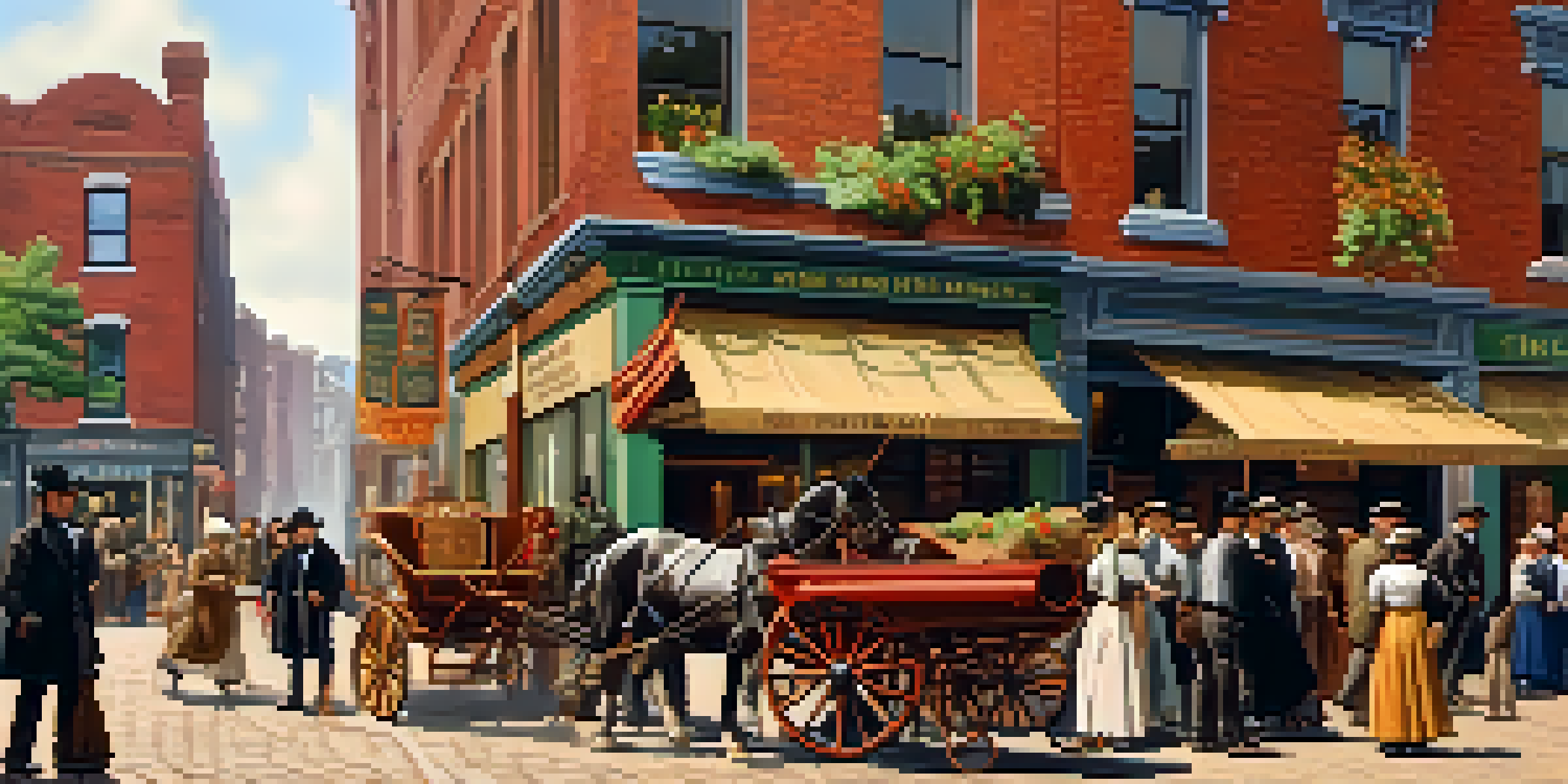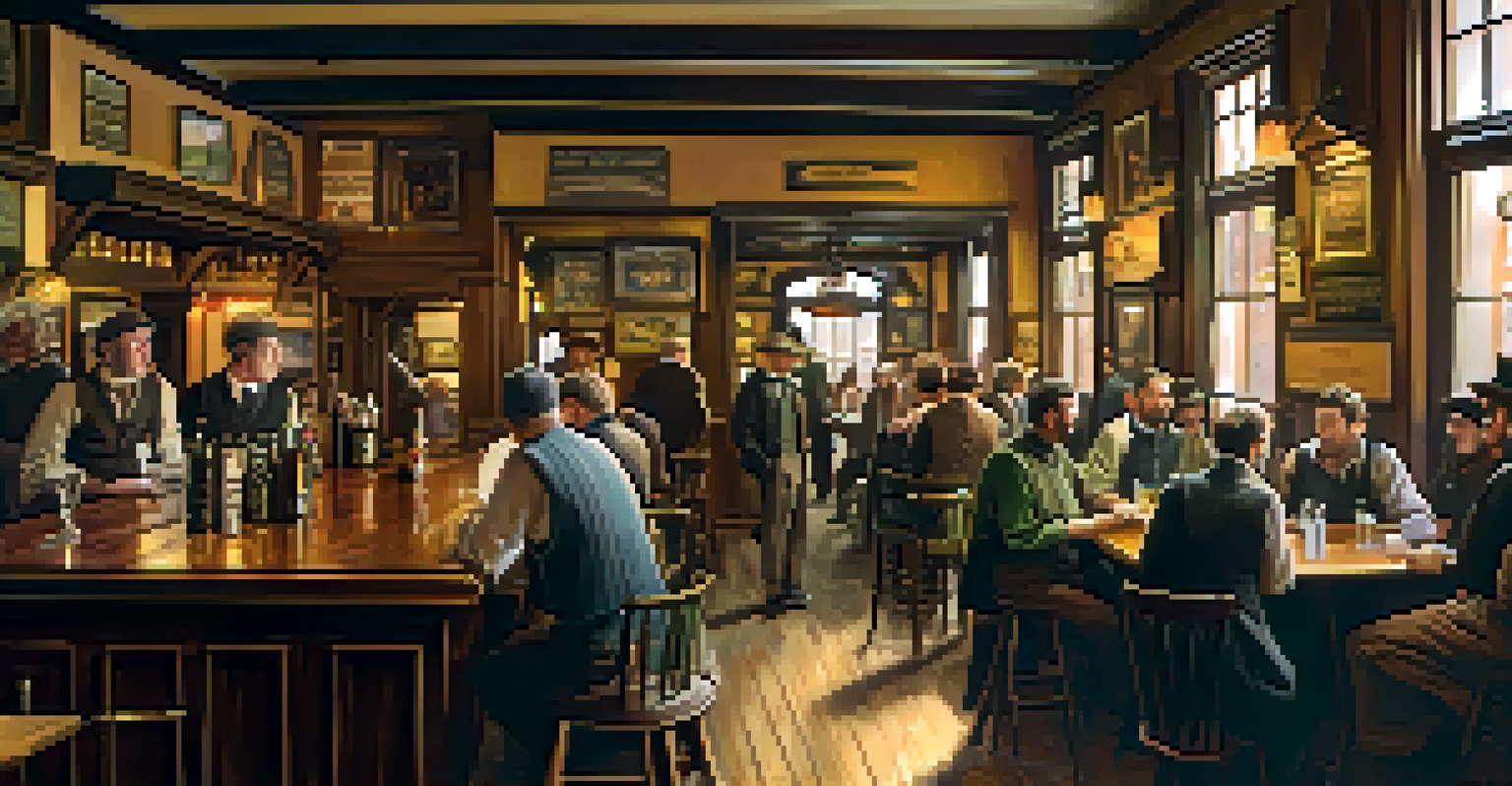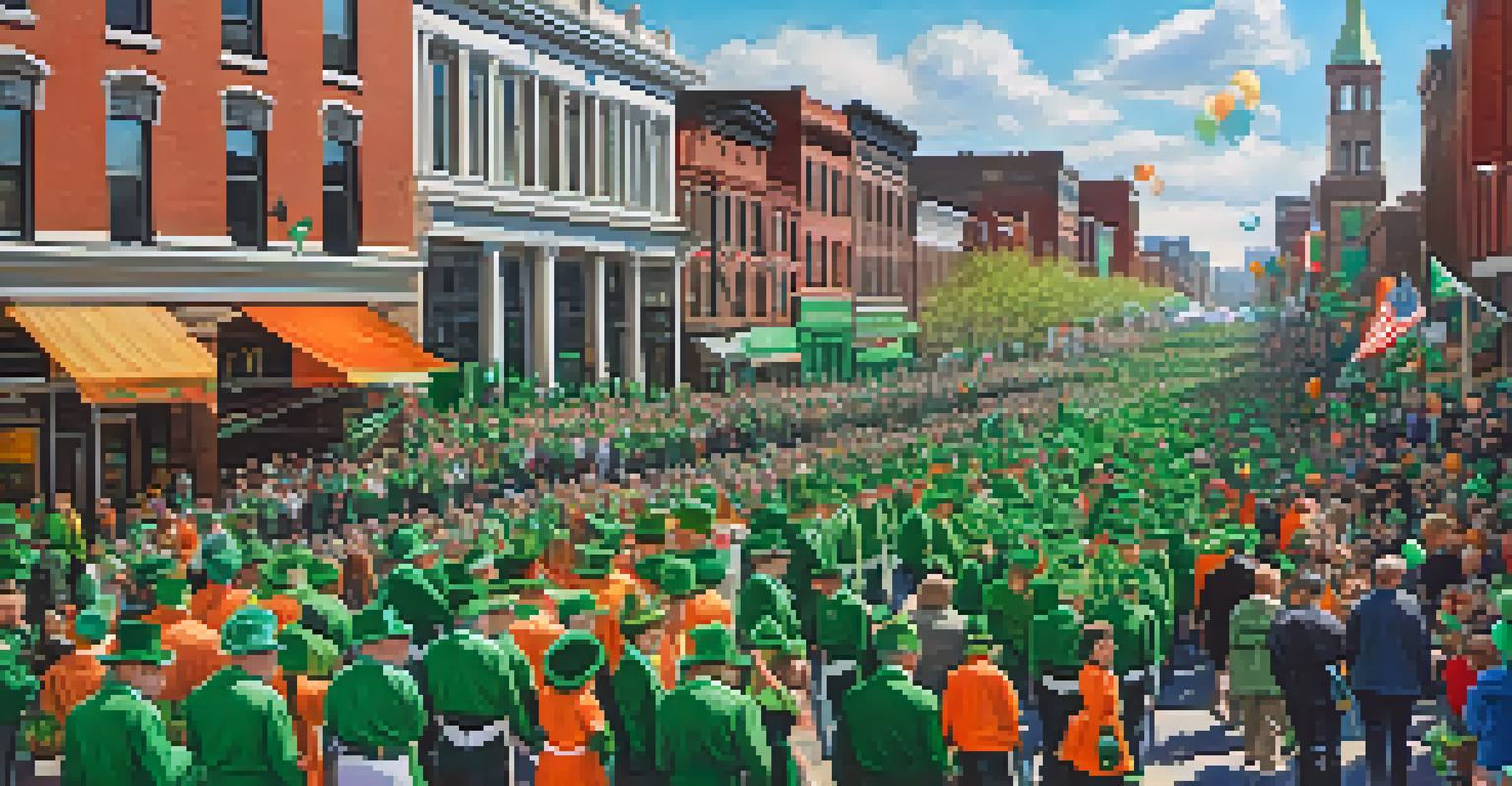The Irish Influence: Buffalo's 19th Century Immigration Boom

The Context of 19th Century Irish Immigration
In the 19th century, Ireland faced significant challenges, including the Great Famine of the 1840s, which prompted a mass exodus. Many Irish families sought a better life, and the United States, with its promise of opportunity, became a prime destination. Buffalo, located near Lake Erie and the Canadian border, emerged as a key entry point for these immigrants due to its booming economy and transportation links.
The Irish, as a people, are resilient. They have faced adversity and discrimination, yet they continue to thrive and contribute to society.
The influx of Irish immigrants to Buffalo brought a myriad of cultural and economic changes to the city. They contributed to the labor force, filling jobs in construction, shipping, and factories, which were crucial for the city’s growth during this industrial boom. As they settled in, they also began to establish their communities, which would have lasting impacts on the city's cultural landscape.
This wave of immigration not only reshaped Buffalo's workforce but also enriched its cultural fabric. The Irish brought with them their traditions, music, and festivities, which began to influence the local culture and social dynamics. Buffalo's identity in the late 19th century was significantly shaped by the contributions of its Irish population.
Economic Contributions of Irish Immigrants
Irish immigrants played a vital role in the economic development of Buffalo. Their labor was essential in building the infrastructure, such as roads and railways, that facilitated the city’s growth. The Erie Canal, in particular, was a major project that benefited from this workforce, connecting Buffalo to the interior of the country and boosting trade.

As they established themselves, Irish immigrants began to open their businesses, from taverns to grocery stores, creating a vibrant local economy. These small businesses not only provided employment for fellow immigrants but also catered to the needs of the growing population in Buffalo. This entrepreneurial spirit helped to lay the groundwork for future generations.
Irish Immigration Transformed Buffalo
The influx of Irish immigrants in the 19th century significantly shaped Buffalo's economy, culture, and community structure.
Additionally, the Irish community became active in labor movements, advocating for better working conditions and fair wages. Their involvement in these movements helped to elevate the labor standards in Buffalo, reflecting a shift towards a more organized workforce that demanded rights and recognition.
Cultural Legacy of the Irish Community
The cultural impact of the Irish immigrants in Buffalo is evident in the city’s celebrations and community events. St. Patrick's Day, for instance, has become a significant holiday, celebrated with parades and festivities that honor Irish heritage. These events not only bring the community together but also attract visitors, further enriching Buffalo’s cultural scene.
Immigrants are not just numbers; they are individuals with stories, dreams, and the capacity to enrich our communities.
Irish immigrants also contributed to the arts, particularly in music and literature. Their folk traditions influenced local musicians, giving rise to a unique blend of American and Irish music that resonates in Buffalo today. This cultural exchange has fostered a sense of identity among residents, regardless of their heritage.
Moreover, the Irish established numerous churches and social organizations, which served as a support system for newcomers. These institutions played a crucial role in community cohesion and provided resources for education and social services, helping to integrate Irish immigrants into the broader Buffalo society.
Political Influence of the Irish in Buffalo
As the Irish community in Buffalo grew, so did their political influence. Many Irish immigrants became politically active, often aligning with the Democratic Party, which was seen as more supportive of immigrant rights. This shift allowed them to gain representation and voice their concerns on local issues.
By the late 19th century, Irish Americans were running for office and winning positions in local government. This political engagement helped to address issues such as labor rights, housing, and public services, reflecting the needs of a burgeoning immigrant population. Their involvement laid the foundation for future generations to engage in civic life.
Community Resilience Amid Challenges
Despite facing discrimination and poor living conditions, Irish immigrants formed strong networks that fostered support and solidarity.
The political presence of the Irish in Buffalo also fostered a sense of pride and identity within the community. As they began to see their representatives in office, it encouraged more immigrants to participate in the political process, creating a legacy of activism that continues to influence Buffalo's political landscape today.
Challenges Faced by Irish Immigrants
Despite their contributions, Irish immigrants faced significant challenges upon arriving in Buffalo. They often encountered discrimination and prejudice from established communities, who viewed them as outsiders. This hostility stemmed from economic competition and cultural differences, leading to tensions within the city.
Living conditions for many Irish immigrants were often poor, with overcrowded tenements and inadequate sanitation. These challenges were exacerbated by language barriers and a lack of resources, making it difficult for newcomers to adapt. However, the resilience of the Irish community allowed them to persevere and gradually improve their circumstances.
In response to these challenges, Irish immigrants formed strong community networks that provided mutual support. These networks included social clubs, churches, and organizations that helped newcomers navigate their new environment. By fostering a sense of solidarity, the Irish community was able to combat discrimination and build a foundation for future success.
The Role of Religion in Irish Life
Religion played a central role in the lives of Irish immigrants in Buffalo, with the majority identifying as Catholic. The establishment of churches provided not only a place for worship but also a sense of community and belonging. These churches became the heart of Irish neighborhoods, offering social services and educational programs.
The Catholic faith also influenced the cultural practices of the Irish community. Religious festivals, such as feast days and processions, became important events that strengthened community ties and celebrated their heritage. These traditions have continued to thrive in Buffalo, showcasing the lasting impact of Irish culture on the city.
Cultural and Political Legacy Endures
The contributions of Irish immigrants have left a lasting impact on Buffalo's cultural celebrations and political landscape.
Additionally, the Irish clergy played a significant role in advocating for the needs of their community. They often addressed social issues, such as poverty and labor rights, pushing for reforms that would benefit their parishioners. This advocacy helped to elevate the status of the Irish in Buffalo, contributing to their integration into American society.
The Lasting Impact of Irish Immigration on Buffalo
The legacy of Irish immigration in Buffalo is visible in many aspects of the city today. From neighborhoods with deep Irish roots to annual celebrations that honor their heritage, the influence of Irish immigrants continues to shape Buffalo's identity. This cultural richness adds to the city’s appeal, making it a vibrant place to live and visit.
Moreover, the Irish experience in Buffalo serves as a testament to the broader immigrant narrative in the United States. It highlights the resilience and determination of those who sought a better life, contributing to the diverse tapestry that defines American society. The stories of these immigrants remind us of the strength found in community and shared heritage.

As Buffalo moves forward, the contributions of the Irish community remain a vital part of its history. Their struggles and successes are woven into the fabric of the city, ensuring that the spirit of the Irish immigrants will be remembered and celebrated for generations to come.